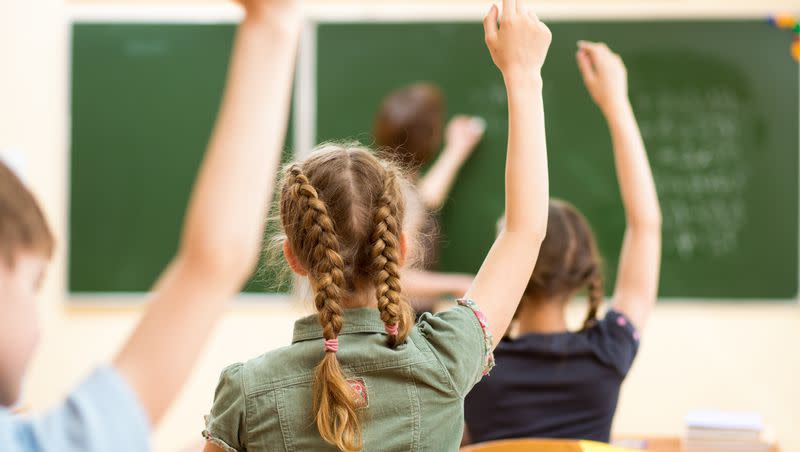Apps for schools, parents and students that make back to school easier

When James Randolph was about to start middle school, he was stressed. Not necessarily about algebra or history, but over learning to open his locker. His mom drove him to school one weekend, just so he could practice opening it over and over again.
In an email to the Deseret News, James wrote that he didn’t want other students to suffer this same first day of school stress, so after graduating high school, he created a solution. Practice Lock is a 99-cent iOS app that allows kids to program their locker combination and then get step-by-step instructions for how to open it.
Once they’ve mastered the digital lock by following those instructions, they can take away the walkthrough and do it on their own until they feel confident.
Worried about your child going back to school this year? Don’t be. Here are some more apps that can make things a little easier.
Google Play Books
For moms and dads tired of nagging their kids about reading, Google has a new feature to help. By using a combination of Google Play Books and Family Link, students can practice reading and parents can monitor their progress. The Google Play Books app (iOS and Android) has millions of ebooks, comics, textbooks and audiobooks to enjoy.
Many of them are free and work with Reading practice, a feature that helps kids improve vocabulary and comprehension skills. Reading practice allows students to track their reading position, hear the pronunciation of a word or sentence, view the definition of a word and then practice any challenging words at the end of each page.
For parents to get insights into a student’s reading habits, first make sure their account is set to share its app activity data for Google Play Books. Moms and dads can do this through Controls>Account settings on Family Link or turn on “Also allow your child to change this setting” to let kids give permission on their own.
Open the Family Link app>select child>Highlights. Parents can view progress on the most recent book the child has read, opened and/or completed. They’ll also be able to view the book the student has read the most in the last seven days and how often.
SchoolBinder
Parents have worries when kids go back to school, too, and often, a big part of that is keeping them safe on social media. Utah is the first state to pass legislation regulating social media for minors. Among other things, one law requires social media companies to get consent from a parent or guardian before any Utahn under age 18 can open an account. Another piece of legislation bans social media companies from using any design features that causes a minor to become addicted to the platform. These laws go into effect next March.
But some school districts are taking matters into their own hands, placing restrictions on how employees use official school social media accounts or banning them all together. Some districts are using companies like California-based ParentSquare to push information in a more effective way to traditional social networks like Facebook and X, which was previously known as Twitter.
But SchoolBinder is an app and website that takes it one step further. Eighty Utah schools and 15 districts will be using it next school year. Founded in Utah, the program has a proprietary, secure social feed feature that steers people away from popular social platforms. Anyone can follow the school’s feed through the app or online, but only posts approved by administrators or other assigned school personnel are allowed.
SchoolBinder CEO Eric Hall says it’s a way to ensure all school groups’ accomplishments are represented because it allows more people to post to the feed, but with guardrails.
“As a parent, I noticed many of the clubs and less popular sports weren’t highlighted on the school’s social media. SchoolBinder allows these groups to assign contributors to post their own achievements,” he said in a phone interview.
The other difference between traditional social media and the app’s social feed is that is does not allow likes or comments on any posts.
“We’re not having a popularity contest,” Hall said, “we want to celebrate people, but do it in a way that is safe.”
The app is a place where schools can post calendars, announcements, ticketing and lunch menus for easy access. It’s also a hub for one-way communication from coaches, administrators and teachers to students and parents. While direct messaging is allowed, no one can delete conversations and administrators can view them at any time. Schools or school districts must purchase Schoolbinder and other similar resources, but if they do, it’s then available as a free tool for parents and students.
Parents should check in with their kids’ schools to find out whether they may be using one of these alternative methods of communication this year.
Back-to-school worries come from students of all ages and their parents. These digital tools may be just the thing to ease some of the concern.

